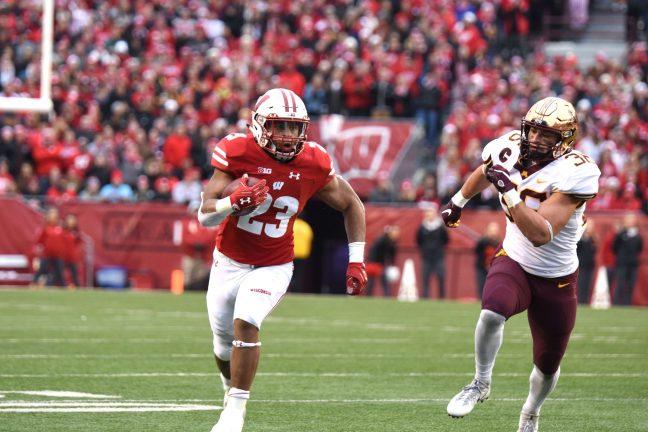In a historic decision, Democratic California Gov. Gavin Newsom signed CA SB206 Sept. 30, which would allow college athletes in California to receive compensation from outside sources, such as a videogame company or memorabilia store.
Immediately following this long overdue decision, Wisconsin Athletic Director Barry Alvarez said the decision would certainly impact Wisconsin’s scheduling going forward.
“I wouldn’t schedule anyone from California right now if they have different rules than we do,” Alvarez said. “Then all the sudden they aren’t amateurs … as a former coach and someone who had to go out and recruit athletes, you start thinking of ways that you can capitalize on this. You have an excellent athlete someplace and you find him a sponsorship – whether it be a car dealership or some business or individuals. This person is your sponsor and this is how much you’re going to make … so you’re paying players.”
While Alvarez is correct that SB206 does allow athletes to profit while they are still technically amateurs, what is the problem with this?
Close yours eyes and think of someone who represents the University of Wisconsin. Who would you name? Is it a Dr. Andrew Kydd, a political science professor? Is it Chancellor Rebecca Blank? Chances are, no.
UW Athletics: An examination into argument over student-athlete compensation
Chance are, if you asked someone on the street in Madison or elsewhere in the country, Russell Wilson, JJ Watt, Sam Dekker and Jonathan Taylor would be the names mentioned — all current or former athletes here at UW.
These athletes have allowed UW to become second in the nation in athletics revenue, to the tune of nearly $149 million annually. What do athletes receive in return for this large economic contribution? Some parkas, backpacks and scholarships.
Yes, it is clear that receiving a full-ride to a university such as UW is a tremendous weight off a student’s shoulders, but with the number of #23 jerseys I see daily around campus, it makes me wonder why the university is the sole benefactor of student athletes’ hard work.
The Kohl Center and Camp Randall are continually packed with screaming fans. Athletes such as Brad Davidson, Jack Coan and various others are risking their health and future prospects for parkas and scholarships, while Chancellor Blank and AD Alvarez count the money before deciding to spend it on bureaucratic nonsense.
“I have no interest in running professional teams at the University of Wisconsin … that’s not our mission,” Blank said last year. “That doesn’t relate to our academics … I believe deeply in student-athletes, and I think Wisconsin is the example of how you can have a strong program with student-athletes who actually perform well both in the classroom and at sports.”
Nigel Hayes discusses student athlete compensation, player boycotts
According to a 2012-13 report to the Board of Regents, “University of Wisconsin student-athletes carried a 3.02 cumulative GPA at the end of the Spring 2013 term. After the Spring 2013 semester, 385 student-athletes (52%) carried a 3.00 GPA or above.”
It is clear athletes can handle being students, but can Chancellor Blank and AD Alvarez handle handing over money to athletes they constantly use?
Opponents of SB206 say it will lead to the eventual death of the NCAA, but is that such a bad thing? Regardless of pay for athletes here at UW, I guarantee Camp Randall will still be packed every fall and the Kohl Center will be filled come winter.
Jonathan Taylor is one of the favorites to win the 2019-20 Heisman Trophy, meaning his face will be in every commercial nationwide, his jersey will be worn across the country and his autographs will undoubtedly be sold online — all earning money for the university or fans. Taylor, on the other hand, will receive zero.
Opponents claim that paying athletes will take the student out of student-athlete — they are clearly wrong. Wisconsin regularly attracts highly rated athletes who consistently perform well both on the field and in the classroom. Paying athletes for their sacrifices is just a commonsense measure.
William Keenan ([email protected]) is a senior studying political science.














